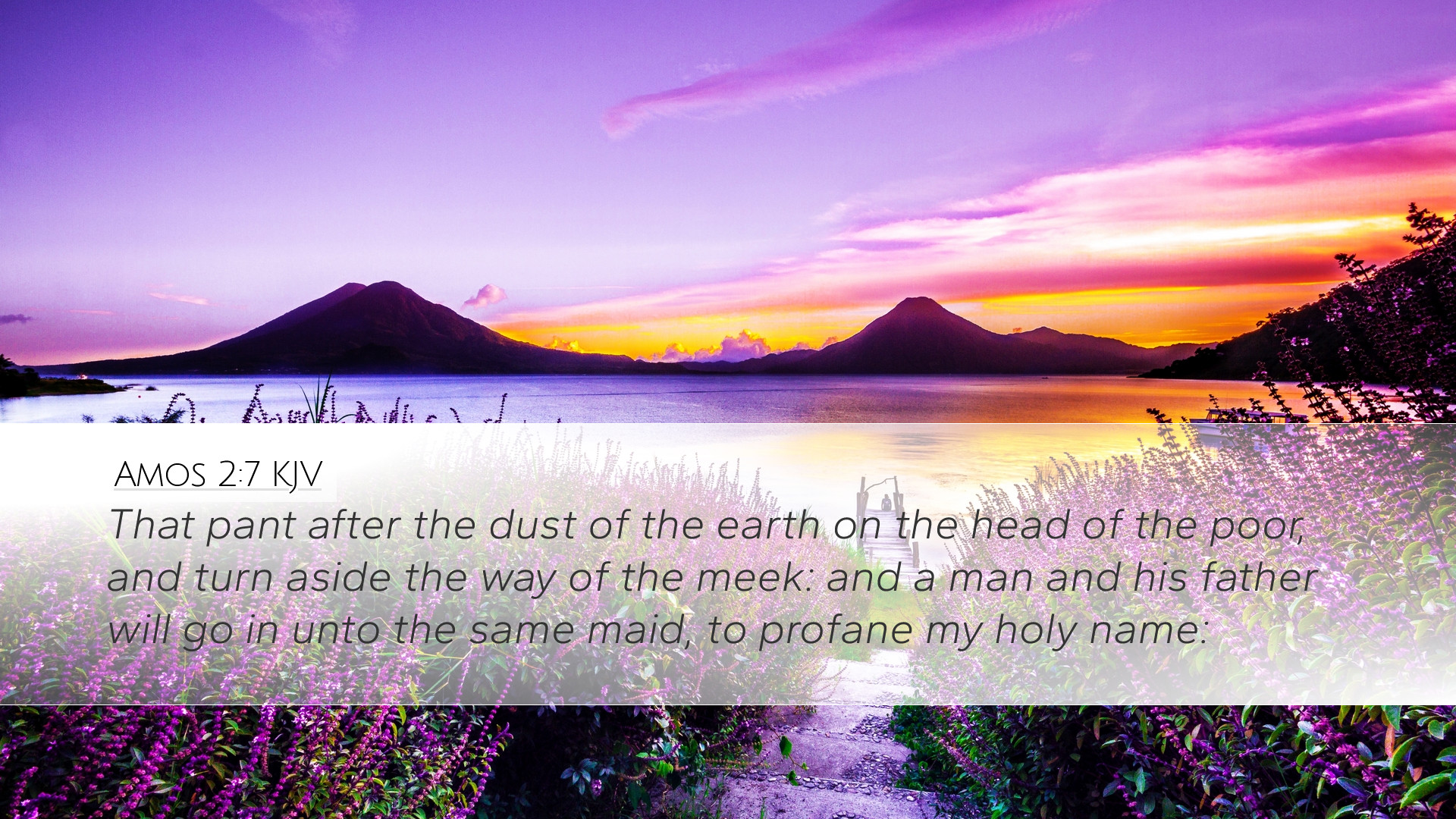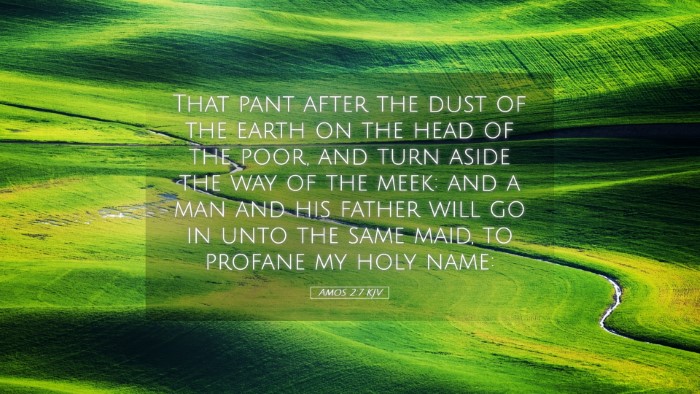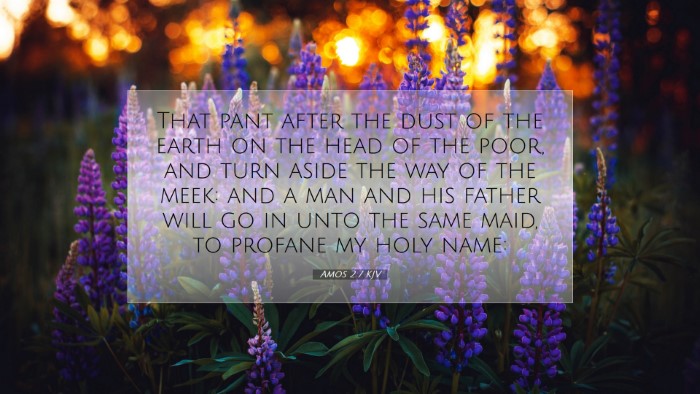Old Testament
Genesis Exodus Leviticus Numbers Deuteronomy Joshua Judges Ruth 1 Samuel 2 Samuel 1 Kings 2 Kings 1 Chronicles 2 Chronicles Ezra Nehemiah Esther Job Psalms Proverbs Ecclesiastes Song of Solomon Isaiah Jeremiah Lamentations Ezekiel Daniel Hosea Joel Amos Obadiah Jonah Micah Nahum Habakkuk Zephaniah Haggai Zechariah MalachiAmos 2:7
Amos 2:7 KJV
That pant after the dust of the earth on the head of the poor, and turn aside the way of the meek: and a man and his father will go in unto the same maid, to profane my holy name:
Amos 2:7 Bible Commentary
Commentary on Amos 2:7
The verse Amos 2:7 states: "They pant after the dust of the earth on the head of the poor, and turn aside the way of the meek: and a man and his father will go in unto the same maid, to profane my holy name." This verse is part of the larger context in which the prophet Amos addresses the social injustices prevalent in Israel.
Social Injustice and Human Exploitation
Amos is called upon to articulate the grievances God has against the people of Israel, especially regarding their treatment of the vulnerable and impoverished. The imagery in this verse is powerful; they "pant after the dust of the earth," indicating a relentless and insatiable desire to exploit the poor. This metaphor portrays a picture of greed and depravity that leads to the systematic oppression of those unable to defend themselves.
Matthew Henry observes that the phrase “pant after the dust of the earth” can signify a greedy pursuit similar to that of a hunter after his prey. The poor, being laid low, represent a wealth of opportunities for the unscrupulous rich. This evokes a sense of moral degradation, illustrating how societies can become callously indifferent towards suffering. He emphasizes that this insatiable greed is not merely a personal failing but reflects systemic issues ingrained in the culture.
The Meek and the Categorization of Sin
The second part of the verse: “turn aside the way of the meek,” refers to how the powerful obstruct justice for the weak. Adam Clarke notes that the 'meek' here could reflect those who are humble and dependent on God, illustrating how their path to righteousness is deliberately hindered. The phrase highlights a theological and moral reality: those who oppress the meek are not just transgressing social statutes but are also violating God's covenantal laws. The verse illustrates how ethical behaviors are paramount to communal harmony and divine favor.
Innuendos of Sexual Immorality
The latter part of the verse, which indicates a man and his father “will go in unto the same maid,” points towards a perversion of familial and societal morals. Albert Barnes reflects on this phrase as indicative of the sexual immorality rife in Israel, where the sanctity of family was compromised. It shows a society that not only exploits the economically disadvantaged but also disrespects the moral fabric that binds families together.
This particular sin, alongside economic exploitation, illustrates a broader theme prevalent in prophetic literature: that a society’s sins manifest in both economic oppression and sexual immorality. The mention of "to profane my holy name" demonstrates the impact of these sins on their relationship with God. It underscores how ethical violations lead to divine disenchantment and reflects a broader spiritual truth—unjust actions and immoral behaviors sully one's witness before God and humankind.
The Theological Implications
This verse encapsulates several important theological themes:
- The importance of social justice: The consistent prophetic cry for justice (from Amos and other prophets) serves as a foundation for understanding God's heart toward the poor and marginalized.
- The dignity of humanity: All men and women are created in the image of God, and the exploitation of the vulnerable by the powerful is a direct affront to their dignity.
- The nature of sin: Sin is multifaceted, encompassing both economic injustice and personal immorality; each is symptomatic of a broader failure to honor God’s commandments.
- Divine response to sin: The prophetic tradition informs readers that God’s justice will not remain silent indefinitely. The call to repentance remains central.
Application for Today
Today, the call of Amos resonates with significant weight as contemporary issues involve economic exploitation, immorality, and systemic injustices in societies across the globe. Pastors and theologians are encouraged to engage their communities with the same fervor that Amos displayed toward injustices. The need to advocate for the poor, to protect the vulnerable, and to live godly lives is as pressing now as it was in the days of Amos.
The examination of personal and corporate ethics, in light of this scripture, leads to practical applications in church leadership, community outreach, and personal accountability. The church is called to reflect God’s character by addressing the plight of the poor and modeling sexual purity, thereby bringing glory to His name.


